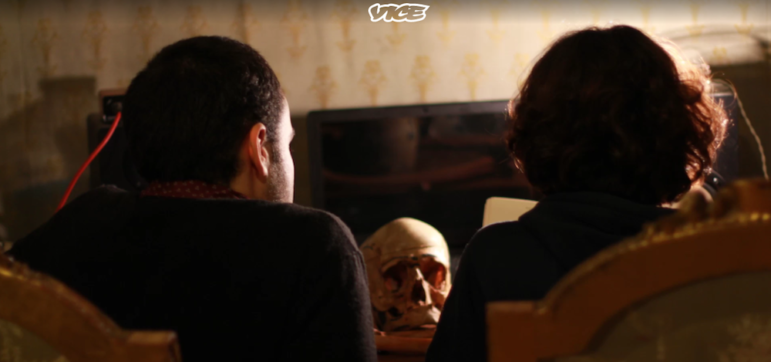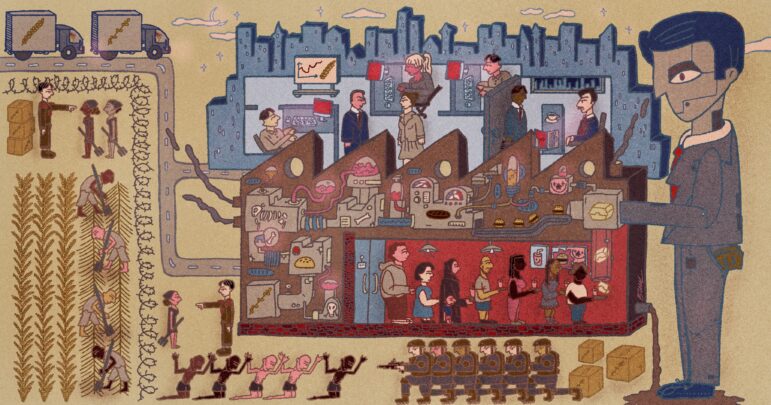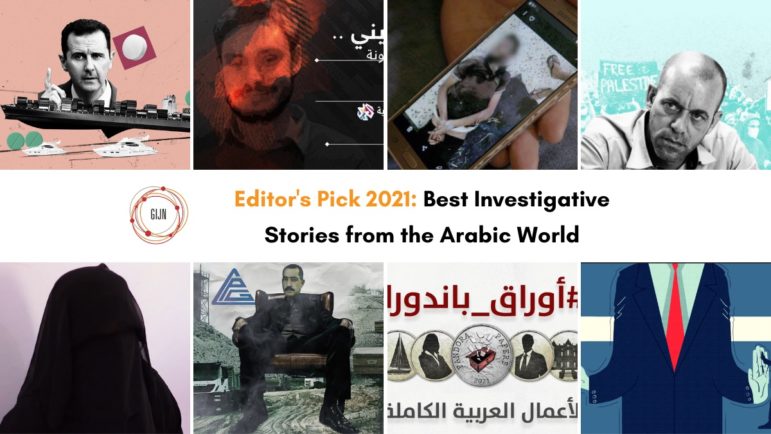

In July 2018, VICE Arabia published an investigation revealing that cadavers were being exhumed and sold to medical students in Egypt.
Skeletons in the Closet: How VICE Arabia Exposed Cadaver Smuggling in Egypt

In July 2018, VICE Arabia published an investigation revealing that cadavers were being exhumed and sold to medical students in Egypt. Screenshot.
Early in February, VICE joined the wave of layoffs affecting digital news outlets such as BuzzFeed and HuffPost, announcing plans to fire 250 staff members — about 10% of its employees. This was a tumultuous turn of events for the digital news darling with the coveted 18-35 demographic that originally emerged out of the Montreal-based VICE magazine; Disney had poured a $400 million investment into the company in 2015, only to take a $153 million write-down on its investment late last year. But VICE’s Arabic version, VICE Arabia, has so far been spared from layoffs, and the team even has plans to expand its service in the region, according to Wael Mamdouh, senior editor and investigative team head.
During VICE’s dizzying heights in 2017, the Arabic version joined the growing regional hubs with a relatively small full-time team of 22 staff. Based in Dubai, the team relies on about 150 contributors across the Middle East and North Africa. While the Arabic publication covers a wide spectrum of topics — including youth and social issues as well as entertainment and lifestyle — its investigative team came out swinging with an impressive first investigation in July 2018.
“The Medical Theft” uncovered how cadavers were being exhumed and sold in Egypt through a complex network that was supplying medical students who needed corpses and body parts that the public medical schools weren’t supplying for their studies.
Majdolin Hasan, GIJN’s Arabic Editor, interviewed Mamdouh to get the story behind the investigation and learn more about VICE Arabia’s plans for the future. Here’s an edited version of their conversation.
Why did you choose this story to launch VICE Arabia’s investigative journalism work?
We began to work simultaneously on a number of investigations on various topics and geographical areas, but different from the usual investigations in Arab media. This story centered on the consequences of government neglect of social and economic issues such as health, poverty and public service over the long term, leading to crises and crimes far exceeding the actual neglect. In this case, the failure of medical school officials in Egyptian universities to secure the required number of educational cadavers has resulted in the trade of bodies and skeletons through a network that begins with the gravediggers and ends with intermediaries who facilitate the sale between students and thieves.
Journalists Haisam Mahgoub and Aya Khaled revealed the details of an underground world in which medical students were involved in illicit activity in order to complete their studies and practice, and mediators and gravediggers who justify their trade, putting the interests of the living above the worth of the dead. This is what they do to earn a living, and it adds a moral question to the investigation — as do the decision-makers and the consequences of their policies.
The long-term consequences seem frightening, as they have a snowball effect — they drag innocent people like the future doctors into a shady smuggling process. We wanted to prove through this investigation that systematic neglect leads to corruption.
What was the most difficult part of getting the story?
To persuade the students to talk about how they get bones and body parts — and to document that for the first time on video and audio — and to persuade two gravediggers to talk about how they exhume skeletons as soon as the bodies have decomposed.
We decided from the beginning to document this to convey the reality of what is happening on the sidelines of medical studies in Egypt, including scenes some viewers saw as shocking and inhumane in the videos. But we insisted on publishing them, with a statement to indicate that the content may be disturbing. Shock is sometimes useful for attracting attention and revealing the seriousness of certain issues.
This is what was achieved, and we have seen it in reader feedback. Medical students in Egyptian institutions contacted us to tell more stories about buying dead bodies from graveyards; doctors shared with us their own experiences, saying that buying and smuggling the dead has been a common practice for many years. Also, some members of Parliament promised that they would vote to adopt new legislation forbidding these practices.
What are some of the hurdles you face when delving into investigative journalism in the region?
Press work in the Arab region is fraught with obstacles and difficulties that may not be obvious, especially with the challenges that the region faces from armed conflict, terrorism and political conflicts. These difficulties are compounded by the scope of our coverage, which includes all Arab countries; it is cumbersome professionally and logistically, but it is not an obstacle that makes our work impossible. The difficulties and obstacles to investigative work in the region are also the reasons for the success and distinction of this type of reporting. If what we did was easy, it would pass without anyone feeling it, and investigative journalism would not influence and produce major changes in the world.
How is working in the region different from other places around the world?
We are working during one of the region’s darkest periods, between political fluctuations and armed conflicts driven by the interests of regional and international parties. [Editor’s Note: In December 2018, VICE Arabia published an investigation into killings in Syria’s military prisons.] This is a delicate situation that impacts our work — a cross-border platform that is not linked to the internal policy of a particular country.
In addition, there are no laws to protect journalists, facilitate their work and ensure the free circulation of information, except for limited and insufficient attempts in some Arab countries. The result is that we have a hostile environment for journalism and media, which requires more effort and attention to detail to get the best content possible and with minimal loss of journalists’ lives and harm to the profession. There are other difficulties: the lack of proper training and skills development for local journalists, particularly in aspects such safety and security.
What are VICE Arabia’s plans for future investigative stories?
We are currently working on a plan to produce written and visual investigative and in-depth reports from all our coverage areas, and are planning to expand our media network and develop diverse investigations. We also plan to have more stories from countries like Mauritania and Yemen.
Does VICE Arabia rely on an in-house team or is the plan to collaborate with local journalists?
Our full-time staff at VICE Arabia includes a distinguished group of journalists and producers, but the nature and scope of our work requires a wider network of journalists, producers and crews, so we collaborate with a large group of freelance journalists. We try to maintain strict standards in all aspects — including written, technical, legal and ethical issues — to ensure that investigations meet with VICE’s international standards.
VICE has a reputation for being image-driven and sensational at times. How do you stay focused on the investigation?
Different VICE platforms offer a variety of content for young adults spanning lighter topics as well as documentary films and investigative reports. The Arab youth, with their educational, social and age differences, are looking for content that respects their minds, interacts with them and discusses their issues, and this is what we are trying to do.
 Majdoleen Hasan, GIJN’s Arabic editor, is an award-winning journalist who has worked with Global Integrity, 100Reporters and Arab Reporters for Investigative Journalism. She was the director of an investigative journalism unit in Jordan and was the first Jordanian to file a case against the Jordanian government for denying her right to public information.
Majdoleen Hasan, GIJN’s Arabic editor, is an award-winning journalist who has worked with Global Integrity, 100Reporters and Arab Reporters for Investigative Journalism. She was the director of an investigative journalism unit in Jordan and was the first Jordanian to file a case against the Jordanian government for denying her right to public information.











